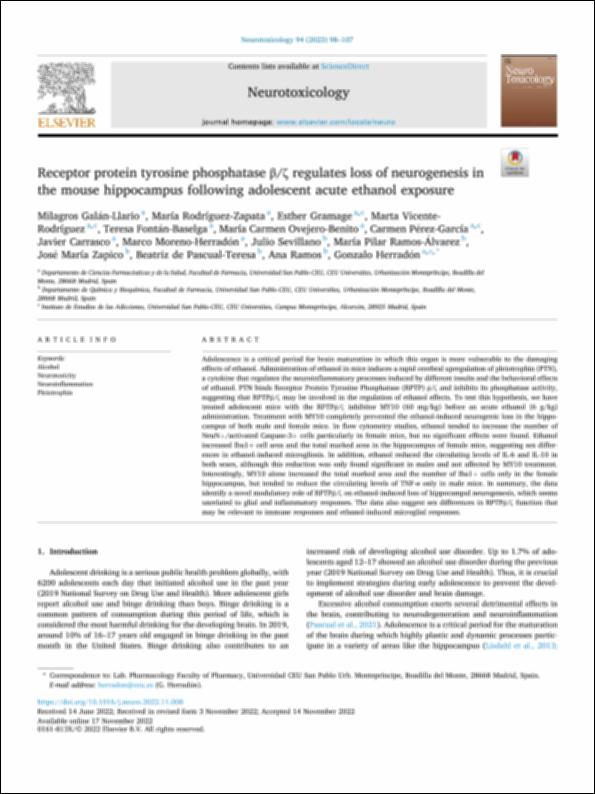Por favor, use este identificador para citar o enlazar este ítem:
http://hdl.handle.net/10637/14550Receptor protein tyrosine phosphatase β/ζ regulates loss of neurogenesis in the mouse hippocampus following adolescent acute ethanol exposure
| Título : | Receptor protein tyrosine phosphatase β/ζ regulates loss of neurogenesis in the mouse hippocampus following adolescent acute ethanol exposure |
| Autor : | Galán Llario, Milagros Rodríguez Zapata, María Gramage Caro, Esther Vicente Rodríguez, Marta Fontán Baselga, Teresa Ovejero Benito, María del Carmen Pérez García, Carmen Carrasco, Javier Moreno Herradón, Marco Sevillano Fernández, Julio Ramos Álvarez, María del Pilar Zapico Rodríguez, José María De Pascual Teresa, Beatriz Ramos González, Ana Herradón Gil-Gallardo, Gonzalo |
| Materias: | Alcohol; Neurotoxicity; Neuroinflammation; Pleiotrophin |
| Editorial : | Elsevier |
| Citación : | Milagros Galán-Llario, María Rodríguez-Zapata, Esther Gramage, Marta Vicente-Rodríguez, Teresa Fontán-Baselga, María Carmen Ovejero-Benito, Carmen Pérez-García, Javier Carrasco, Marco Moreno-Herradón, Julio Sevillano, María Pilar Ramos-Álvarez, José María Zapico, Beatriz de Pascual-Teresa, Ana Ramos, Gonzalo Herradón, Receptor protein tyrosine phosphatase β/ζ regulates loss of neurogenesis in the mouse hippocampus following adolescent acute ethanol exposure, NeuroToxicology, Volume 94, 2023, Pages 98-107, ISSN 0161-813X, https://doi.org/10.1016/j.neuro.2022.11.008. |
| Resumen : | Adolescence is a critical period for brain maturation in which this organ is more vulnerable to the damaging effects of ethanol. Administration of ethanol in mice induces a rapid cerebral upregulation of pleiotrophin (PTN), a cytokine that regulates the neuroinflammatory processes induced by different insults and the behavioral effects of ethanol. PTN binds Receptor Protein Tyrosine Phosphatase (RPTP) β/ζ and inhibits its phosphatase activity, suggesting that RPTPβ/ζ may be involved in the regulation of ethanol effects. To test this hypothesis, we have treated adolescent mice with the RPTPβ/ζ inhibitor MY10 (60 mg/kg) before an acute ethanol (6 g/kg) administration. Treatment with MY10 completely prevented the ethanol-induced neurogenic loss in the hippocampus of both male and female mice. In flow cytometry studies, ethanol tended to increase the number of NeuN+/activated Caspase-3+ cells particularly in female mice, but no significant effects were found. Ethanol increased Iba1+ cell area and the total marked area in the hippocampus of female mice, suggesting sex differences in ethanol-induced microgliosis. In addition, ethanol reduced the circulating levels of IL-6 and IL-10 in both sexes, although this reduction was only found significant in males and not affected by MY10 treatment. Interestingly, MY10 alone increased the total marked area and the number of Iba1+ cells only in the female hippocampus, but tended to reduce the circulating levels of TNF-α only in male mice. In summary, the data identify a novel modulatory role of RPTPβ/ζ on ethanol-induced loss of hippocampal neurogenesis, which seems unrelated to glial and inflammatory responses. The data also suggest sex differences in RPTPβ/ζ function that may be relevant to immune responses and ethanol-induced microglial responses. |
| URI : | http://hdl.handle.net/10637/14550 |
| Derechos: | http://creativecommons.org/licenses/by-nc-nd/4.0/deed.es |
| Fecha de publicación : | 26-ene-2023 |
| Centro : | Universidad San Pablo-CEU |
| Aparece en las colecciones: | Facultad de Farmacia |
Los ítems de DSpace están protegidos por copyright, con todos los derechos reservados, a menos que se indique lo contrario.


